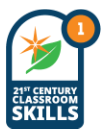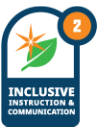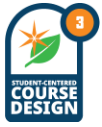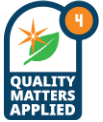The landscape of higher education is rapidly transforming. In order to stay relevant, competitive, and to meet 21st Century student expectations, there is a tremendous need for faculty to consistently develop within the profession. There is a great demand for faculty who have the skills to teach in online, virtual, blended and Hyflex modalities, and for faculty who can skillfully incorporate technology into Face-to-Face (F2F) classrooms. MATC and the Center for Teaching Excellence are committed to helping our faculty adapt to these contemporary approaches to teaching and learning.
In MATC’s Standards of Teaching Excellence, faculty embrace a demonstration of 21st Century Classroom Skills. MATC faculty demonstrate 21st Century Classroom skills to support student success in learning by using technology to: manage learning content, effectively communicate, provide regular and substantive feedback, and assess learning. MATC faculty maintain a level of professionalism that is consistent with best practices of teaching in the 21st Century.
Developed by a team of faculty and administrators from across the college, the 21st Century Classroom Levels provide faculty with a scaffolded process that faculty use to learn and demonstrate their 21st Century teaching skills. The 21st Century Classroom Guiding Principles:
- Set expectations for teaching that are equitable for all faculty.
- Support student success in learning by using technology to effectively communicate, provide feedback, and manage learning content.
- Support the achievement of faculty professional development goals by providing peer-to-peer feedback and real-time support
Badges are awarded in SumTotal upon the completion of each 21st Century Classroom Level. All faculty are required to demonstrate Level 1 skills in order to maintain a teaching assignment. All MATC faculty are currently required to be actively working on Level 2.
- Level 1: 21st Century Classroom Skills
- Level 2: Inclusive Instruction & Communication
- Level 3: Student-Centered Course Design
- Level 4: Quality Matters Applied
- 21st Century Classroom Support for Faculty

For a valuable reference resource of Level 1 skills, faculty should refer to the 21st Century Level 1 Checklist. The required Level 1 skills include:
- Use of Microsoft Office Suite or Google Suite, file management, sending and receiving emails with attachments, using Internet browsers
- Saving files as .pdfs
- Posting syllabi and faculty information in Blackboard (Bb)
- Creating Announcements in Bb
- Entering grades in the Bb Grade Center
- Providing substantive feedback to students
- Being available and responsive to student communication
- Utilizing video conferencing software
- Creating a diverse, equitable and inclusive learning environment
- Connecting students to MATC resources

For a valuable reference resource of Level 2 skills, faculty should refer to the 21st Century Level 2 Checklist.
The required Level 2 skills include:
- Creating course content in Bb folders or modules
- Using the Bb Grade Center
- Using collaborative digital tools
- Providing video captioning and making content accessible to all students
- Exporting and archiving the course in Bb
- Creating course material that represents MATC’s commitment to diversity, equity and inclusion
- Personalizing your course
- Utilizing Career Essentials rubrics (for post-secondary courses)

Faculty who wish to attain 21st Century Classroom Level 3 begin by attending the Applying the QM Rubric (APPQMR) course, which is an asynchronous online course through Quality Matters (QM). The Center has allocated funding for faculty to attend this course for free, but funds are available on a first come basis each fiscal year, so please sign up early! In order to be eligible for Level 3, Level 1 and Level 2 must first be obtained.
Faculty can start this process by:
- Selecting a date to attend the course and creating a membership account associated with MATC (non-membership courses have a higher course fee, so this is an important step).
- After you have done this, email The Center with the date you would like to attend with 2 weeks advance notice prior to the start date of the course.
- The Center will then complete your registration; you will receive a notification by QM when you have been registered for the course.
After you successfully complete the QM Rubric course, you will become part of a cohort of faculty who will have a Faculty Blackboard Liaison Mentor. In this team environment, you will apply what you have learned in the QM Rubric course through five 21st Century Classroom course reviews. Once the five course reviews are successfully completed, you will obtain a Level 3 badge and estabilsh yourself as a leader among your peers in providing high quality courses for our students!

Faculty who wish to attain the 21st Century Level 4 will attend the Higher Ed Peer Reviewer course through Quality Matters (QM). The Center has allocated funding for faculty to attend this course for free, but funds are available on a first come basis each fiscal year, so please sign up early! In order to be eligible for Level 4, Level 1, Level 2, and Level 3 must first be obtained.
Faculty can start this process by:
- Selecting a date to attend the course and creating a membership account associated with MATC (non-membership courses have a higher course fee, so this is an important step).
- After you have done this, email The Center with the date you would like to attend with 2 weeks advance notice prior to the start date of the course.
- The Center will then complete your registration; you will receive a notification by QM when you have been registered for the course.
In this course, you will draw upon all you have learned in your previous levels and learn how to apply the QM Rubric in the review of higher education courses. It provides a deep understanding of the highest quality courses.
After you successfully complete the QM Higher Ed Peer Reviewer course, you will become part of a cohort of faculty who will have a Faculty Blackboard Liaison Mentor. In this team environment, you will apply what you have learned in the QM course through ten 21st Century Classroom course reviews. Once the ten course reviews are successfully completed, you will obtain Level 4. This designation reflects rigorous review by the gold standard organization of Quality Matters.
21st Century Classroom Support for Faculty
The Online Learning Department facilitates the development and delivery of high-quality student learning experiences in online, hybrid, hyflex, and blended formats. In addition to providing online student support, this team provides faculty with consultation and training regarding the effective use of educational technology to support student learning outcomes.
Blackboard and Educational Technology Specialists (staff):
- Provide student support for online learners (Online Manager)
- Facilitate live Blackboard student orientations (Online Manager/Staff)
- Provide resources and consultation to support student success (Online Manager/Staff)
- Administer and maintain the college LMS, as well as other supported educational technologies for online learning (Online Ed Assistants)
- Research, evaluate and implement educational technology software that integrates with our LMS and is functional on most hardware devices and browsers. (Online Staff and Dean)
- Create and publish training related to the use of the LMS and educational tech software for both students and faculty. (Online Ed Assistants)
Blackboard Liaisons (faculty peers):
- Provide faculty support for online teaching
- Facilitate Blackboard faculty training and Blackboard professional development courses
Blackboard Reviewers (QM certified faculty peers):
- Review Blackboard shells of MATC faculty to determine adherence to the 21st Century Classroom standards
The Center for Teaching Excellence supports faculty professional learning at MATC. In addition, The Center supports faculty community engagement and service-learning projects, and the processing and completion of FQAS requirements. There are five support programs within the Center for Teaching Excellence.
Faculty Coaches (faculty peers):
- Support probationary faculty with FQAS requirements including onboarding and classroom observations
- Support continuing faculty with Teaching Action Plans and ongoing professional development
- Assist faculty who need additional support to meet 21st Century Classroom standards. This includes faculty who answered “not yet” to any questions on the Self-Assessment Surveys, those who need a second review after the Blackboard review, and any faculty member who wants additional support with the 21st Century Classroom Levels
Community Engagement and Service Learning (faculty peers):
- Identify, register, and track volunteer opportunities for employees, classroom service learning opportunities, and other aspects of engagement with the community
Faculty Professional Learning Liaisons (faculty peers):
- Facilitate the onboarding and orientation of new faculty
- Plan, teach, schedule, communicate and create professional learning (ZERD) courses, including curriculum updates and alignment with WTCS requirements.
- Plan, teach, schedule, communicate and create timely and responsive workshops and other professional development opportunities
- Align professional development opportunities to the strategic goals of the college and data-informed initiatives
- Assess the effectiveness of professional learning offerings and measure usage in classroom best practices
- Represent faculty in FQAS and other professional learning discussions, adjustments, and updates (as part of the dual appointment with Local 212 embedded in the professional learning liaison positions)
- Advocate for meaningful professional learning opportunities and fair and transparent processes for professional learning requirements
CTE Coordinators (administrators):
- Review and approve FQAS activities and Teaching Action Plans for post-probationary faculty and helps faculty navigate the process with individual contact points and follow-up.
Instructional Designer (staff):
- Provides evidence-supported and ADA compliant course design assistance to faculty
